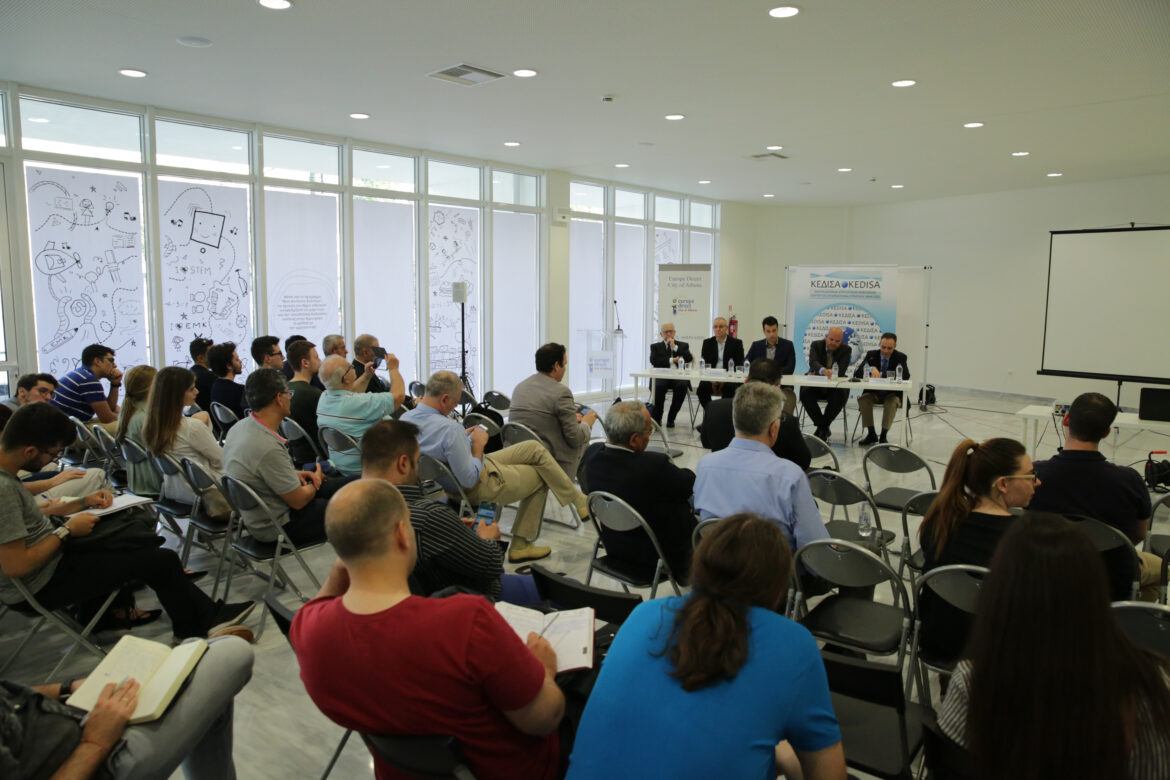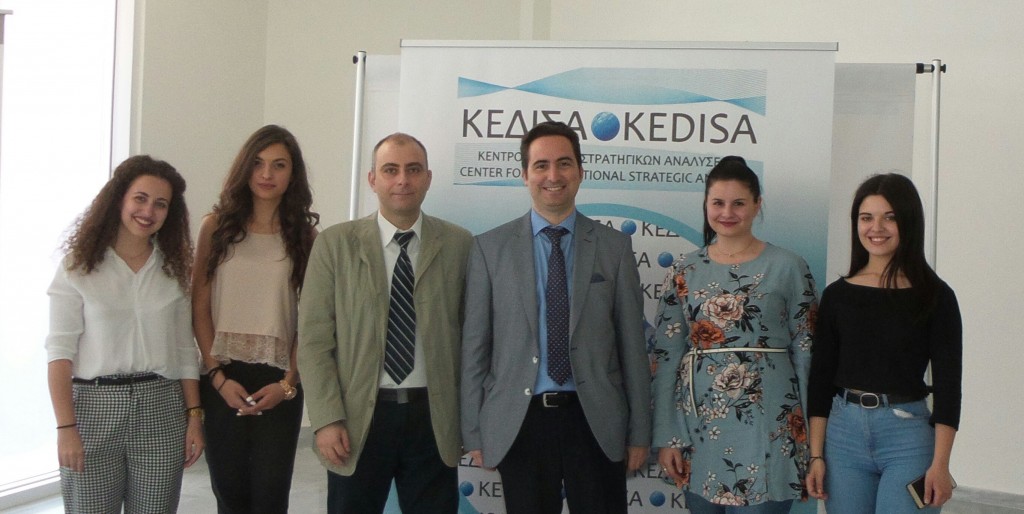The Center for International Strategic Analyses-KEDISA organized with great success on 9 May 2018 the event “Greece Geostrategic Energy Hub of Europe”. The event took place in Sarafeio Center for Sport, Culture and Innovation with the kind support of Europe Direct City of Athens and communication sponsor the website energypress.gr
Speakers of the event were International Relations Expert-Geostrategic Analyst Mr. Vassilis Kopsacheilis, Investigative Journalist and Energy Security Expert Mr. Ioannis Michaletos, Professor of the University of Paris and Geopolitics Expert Mr. Demosthenes Davvetas and Vice President & Executive Director of the Institute of Energy for Southeast Europe (IENE) Mr. Constantinos Stambolis. Coordinator of the event was the journalist, director of eleftherostypos.gr, Mr. George Michaelides.
The Founder & Chairman of the Board Mr. Andreas G. Banoutsos, in his brief greeting and introductory speech, said that Greece has the opportunity to become Europe’s Geostrategic Energy Hub provided that it will participate in the realization of a series of energy projects such as the construction of the gas pipeline East Med, the extension of LNG Revythousa station, the construction of the floating LNG station in Alexandroupolis, the completion of the construction of the TAP (Transadriatic gas pipeline) and the expansion of the Turkish Stream pipeline (which is already under construction) on Greek territory which will transport Russian natural gas to southern Europe bypassing the problematic area of Ukraine. Mr. Banoutsos finally pointed out that it is in the best economic interest of Greece to proceed with the implementation of all the aforementioned energy projects without exclusions and geopolitical considerations.
Mr.Stavros Kalafatis, MP of the 1st District of Thessaloniki and Deputy Head of Foreign Affairs Section of the political party of Nea Democratia (ND), represented the President of the ND Mr. Kyriakos Mitsotakis at KEDISA’s event. In his brief greeting he congratulated KEDISA on its initiative to organize this event, stating that Energy Geostrategy is a matter that remains always important and timely.
Mr. Vasilis Kopsacheilis in his speech said that Greece is being discussed or thought at energy level as a natural gas importer and country transit for foreign suppliers and purchases. The country has little to gain from this, and especially in the prospects of the construction of the East Med pipeline, the country will be called upon to take on major geopolitical risks that are unreasonable and potentially will undermine its national security. He also estimated that the global trend leads to a shift from natural energy resources to modern electricity technologies. Technologies and not natural resources are important, while they are geopolitically neutral. In conclusion, Mr. Kopsacheilis estimated that Greece lost the “train” of natural energy resources and has a short time to enter dynamically in the field of research and development of energy technologies, a geopolitically neutral element that does not require investment in national defense and security, has added value in relation to natural resources, zero environmental risk, zero geopolitical risk, and it is the future that will put Greece on the global energy map.
In his speech, Mr. Ioannis Michaletos said that natural gas is the fuel of the 21st century and that the EU’s energy strategy aimed at reducing Europe’s dependence on Russian gas has virtually failed since there is no other country with the exception of Russia which can adequately and competitively cover Europe’s energy demand. He cited as a prime example of the failure of this policy the very serious possibility of fueling the TAP gas pipeline with Russian gas despite the fact that it was originally designed to transport Azeri gas to Europe via the Southern Corridor. This is because Azeri gas is not enough to make TAP economically viable, nor can the quantities of Azeri gas meet Europe’s energy demand. He also said that liquefied shale gas of the USA is not an alternative for Europe as it is not offered at competitive prices and in sufficient quantities. Finally, he estimated that the situation regarding the implementation of the planned energy projects in Greece is still fluid and we are far from being able to qualify our country as a Geostrategic Energy Hub of Europe.
In his speech, Mr. Demosthenes Davvetas said that Greece should emphasize on cultural geopolitics. It analyzed all aspects of the concept of cultural geopolitics, pointing out that Greece can only obtain significant economic benefits from the successful promotion of its cultural product abroad.
Finally, Mr. Constantinos Stambolis said in his speech that “it is very easy to become victims of illusions about our country becoming an energy hub”. However, he pointed out that our region is developing projects that will involve us in the energy game of the region, not Europe. According to Mr. Stambolis, our country should generate more energy and reduce its energy dependence, estimated at 72.5%. Moreover, he stressed that investments are needed on the one hand in Renewable Energy Sources, on the other hand on interconnections. He estimated that by 2025 Europe’s gas demand would reach 110 billion euros. The gas will mainly come from Russia, as it is the only producer country with spare capacity. Mr. Stambolis also said that in total, through Greece, 13-14 billion cubic meters of natural gas will pass in Europe, while in 2030 the quantity will reach 30 billion just 6% of European demand, concluding that “the numbers cannot support the narrative of Greece as energy hub “.
The speakers panel (from left to right): Constantinos Stampolis (Vice President & Executive Director of ΙΕΝΕ), Demosthenes Davvetas (Professor specialising on Geocultural matters), Giorgos Michailidis (Event Coordinator, Journalist – Director eleftherostypos.gr), Vasilis Kopsacheilis (Internatonalist-Geostrategic Analyst), Ioannis Michaletos (Investigative Journalist – Energy Security Expert)
Andreas G. Banoutsos, Founder & President of KEDISA
Stavros Kalafatis, MP of A’ Thessaloniki, Deputy Head of Foreign Affairs Section (New Democracy party-ND) and representative of the President of ND Mr. Kyriakos Mitsotakis at the event.
(From left to right): Stavros Kalafatis (MP of A’ Thessaloniki & Deputy Head of Foreign Affairs Section ND) & Andreas G. Banoutsos (Founder & President of KEDISA)
Organizing Committee of the Event (from left to right): Sofia Katechi (KEDISA’s Intern), Vaso Kantioti (KEDISA’s Intern), Dr. Petros Violakis (Director of Research of KEDISA), Andreas G. Banoutsos (Founder & President of KEDISA), Fenia Skarla (KEDISA’s Intern), Emy Kefala (KEDISA’s Intern)
(From left to right): Constantinos Stampolis (Keynote Speaker), Andreas G. Banoutsos (Founder & President of KEDISA), Demosthenes Davvetas (Keynote Speaker), Giorgos Protopapas (Executive Director of KEDISA), Dr. Petros Violakis (Director of Research of KEDISA)
(From left to right) : Ioannis Michaletos (Keynote Speaker), Andreas G. Banoutsos (Founder & President of KEDISA), Giorgos Protopapas (Executive Director of KEDISA), Dimosthenis Davvetas (Keynote Speaker)
(From left to right): Ioannis Baltzois (Lt. General Ret.), Vasilis Kopsacheilis (Keynote Speaker), Andreas G. Banoutsos (Founder & President of KEDISA), Giorgos Protopapas (Executive Director of KEDISA), Dr. Petros Violakis (Director of Research of KEDISA)













